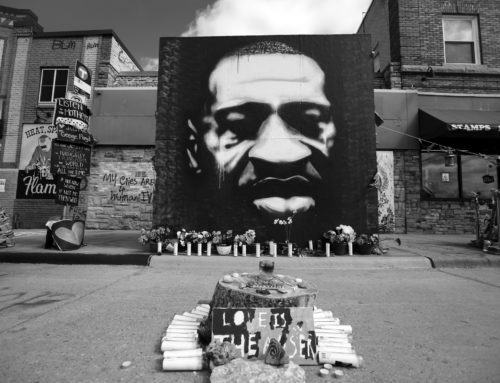By: Monica Duncan
Showtime is now airing a new series about the 2015 escape from the Dannemora Prison in New York. The show looks sensational. And you already know how I mean that. It looks like the flash of illicit sex and the bang of murderers threatening the public with their renewed freedom. We are supposed to watch until the escapees are killed or captured. (Stay tuned to find out which, if you don’t remember the real-life story from three years ago.)
I have seen firsthand the excitement that the filming of this series has brought to the small North Country city of Plattsburgh (the closest city to Dannemora itself) during my visits there. You see, Plattsburgh is my husband’s hometown. And it looks like Showtime is giving us exactly what they think the viewer wants. They are depicting the story by leading with the most sensationalized aspects of it. That is the point of a flash bang. It distracts.
So I am skeptical about what this series will tell and what it will miss, in part because I know that the Showtime folks did not interview one of the key individuals in the actual story, someone from the inside who is liberally depicted in the show. That person is my husband’s brother, Gene Palmer. Gene was the corrections officer charged with unknowingly passing saw blades in a chunk of hamburger meat through a flawed security system. What he thought was a routine delivery ended up including the very tools that would aid in the prison break of two established killers.
The script for “Escape at Dannemora” was largely derived from Inspector General Catherine Leahy Scott’s 154-page report on the matter, and the series has been hawked to the public as a “based-on-a-true-story” drama. Writer Michael Tolkin said in an interview with slashfilm.com that the director, Ben Stiller, “encouraged us to write this as accurate as possible and truthfully as possible.” The people behind this show may have had an agenda in portraying the show as truthful because they wanted it to be taken seriously.
Okay. We’ve seen several episodes now. And I want to turn the screen around for a moment, so that I can face you the viewer. I want to see you sitting on your comfortable couch and ask a couple of questions: Are you kinda watching this like it’s reality TV? Or maybe all those panos make it feel like the truth encased in a movie. If you followed the “story”, does it make you feel like you now have a better sense of what happened, like you would if you watched this on the news? If you’re honest with me, you might admit that the degree of veracity in the account is somewhat unclear. Then you might admit that you don’t really care. I know the feeling. I’ve been there. After all, a good story is a good story. And hey—this is a great story. But it matters how we differentiate the media that we consume.
We can admit here that we don’t actually know exactly where reality ends and fiction begins. But whether or not you think this show is reality indeed matters. Your opinions about the state of our prison system might hinge on your answer. Your opinions about these people will likely hinge on your answer. Your opinion of my brother-in-law will hinge on your answer.
The story that hasn’t been told—because it cannot be found in an inspector general’s report—is how someone starts on one side of the bars and ends up on the other. I am not here to retell a story of the prison break one more time. I am here to remind you that you have not heard the real story, nor will you. Because there are only four people that really knew the events that led up to this prison break at Clinton Correctional Facility (its real name): Richard Matt, David Sweat, Joyce Mitchell, and Gene Palmer. One is dead, two are behind bars, and one is living his life as best he can after making mistakes that he deemed to be a necessary part of doing his job.
Gene Palmer is a man who was passionate about his career, not someone who was careless. Everyone who knows him knows that he has been both a conscientious citizen of his town and workplace. Gene was—and is—respected in his community, and was known as the kind of corrections officer that was valued by inmates and coworkers alike. I think we need to know my brother-in-law’s story, and for me that starts with Gene’s 27-year background as a corrections officer (the prequel, if that makes it more interesting). Gene was in a profession where violence is a normal aspect of daily living. Years of navigating this violence led Gene to construct his own system within the system that both served to maintain peace and keep his fellow corrections officers and the inmate population itself safe. His methods involved building relationships with the people he was protecting us from. A person has to achieve an impressive comfort level with some pretty hard truths to be around rapists and murderers every day and still choose to treat them like people.
Most of us don’t want that job, do we? We want others to do it, and we don’t really want to know how it gets done. But there must be a tricky and constant effort made to balance relationships on both the inside and outside. Gene was certainly a citizen of both worlds, and was governed by the rules of the outside, but also, somehow bound by a culture on the inside most of us really don’t understand. I’d like people to know that he had a role as a respected leader in both of his communities. So how did these communities—because let’s be clear that people are products of their environment—breed this scapegoat? Gene made mistakes in his role as a corrections officer, as did many others within this correctional facility and prison system. Yet he was one of the relatively few who were punished. He was one of two who went to jail for his mistakes. I worry his portrayal in “Escape at Dannemora” serves to further vilify one of many.
This is someone’s life, this is a real person being portrayed as corrupt. I want to appeal to you here to question what you are being told. Let us all listen more before we swallow a TV truth that is as easy to digest as a hunk of meat.
Monica Duncan lives north of Boston where she is a professional musician and writer of literary fiction. Her website can be found here. Her debut novel, Twine, will be released in 2019 by Crowsnest Books.
Image: Clinton Correctional Facility; Dannemora, NY, 2017.









Great insight into a world those of us on the outside are privileged not to understand Monica. May Gene’s reputation as a leader in his community remain.
Great insight into how we as a society are often too quick to form judgements and assign blame despite incomplete facts or even ignorance on a given topic. We want to turn a blind eye while someone else risks their life to keep the peace inside the walls of our corrections system, yet reserve the right to offer commentary and point fingers when things go wrong. These are timely concepts that transcend the Dannemora escape.